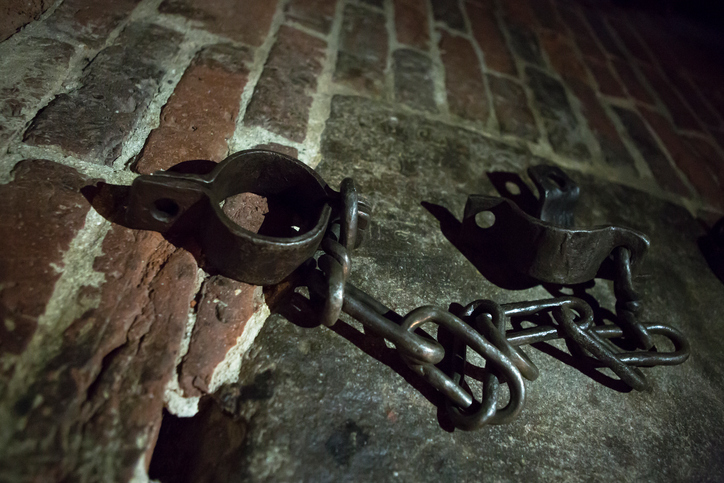by Urban Faith Staff | Jul 4, 2023 | Black History, Headline News, Heritage |
In the nineteenth century, many American communities and cities celebrated Independence Day with a ceremonial reading of the Declaration of Independence, which was usually followed by an oral address or speech dedicated to the celebration of independence and the heritage of the American Revolution and the Founding Fathers. On July 5, 1852, the Ladies’ Anti-Slavery Society of Rochester, New York, invited the Black abolitionist and civil rights leader Frederick Douglass to be the keynote speaker for their Independence Day celebration. The Fourth of July Speech, scheduled for Rochester’s Corinthian Hall, attracted an audience of 600. The meeting opened with a prayer and was followed by a reading of the Declaration of Independence. When Douglass finally came to the platform to deliver his speech, the event took a jarring turn. Douglass told his audience, “This Fourth of July is yours, not mine. You may rejoice, I must mourn.” And he asked them, “Do you mean, citizens, to mock me, by asking me to speak today?”
Within Douglass’ now-legendary address is what historian Philip S. Foner has called “probably the most moving passage in all of Douglass’ speeches.”
What, to the American slave, is your 4th of July? I answer: a day that reveals to him, more than all other days in the year, the gross injustice and cruelty to which he is the constant victim. To him, your celebration is a sham; your boasted liberty, an unholy license; your national greatness, swelling vanity; your sounds of rejoicing are empty and heartless; your denunciations of tyrants, brass fronted impudence; your shouts of liberty and equality, hollow mockery; your prayers and hymns, your sermons and thanksgivings, with all your religious parade, and solemnity, are, to him, mere bombast, fraud, deception, impiety, and hypocrisy—a thin veil to cover up crimes which would disgrace a nation of savages. There is not a nation on the earth guilty of practices, more shocking and bloody, than are the people of these United States, at this very hour.
On this and every July 4th, Americans might do well to re-read and reflect on Douglass’ famous message. It challenges us to move beyond the biases and blind spots of our own cultural privileges and consider those around us for whom, as Langston Hughes said, “America has never been America.”
Read Douglass’ complete speech here, and watch actor Danny Glover recite an excerpt from the address below.

by Caroline Sumlin, Urban Faith Contributing Writer | Mar 8, 2022 | Commentary, Headline News |
 You’re going to rebel once you get to college,” they said to me.
You’re going to rebel once you get to college,” they said to me.
“They” were my high school friends. I was always the Goody Two-Shoes of the group and they always let me know just how weird I was and just how much they hoped I would change my ways. My friends believed that I was a Goody Two-Shoes because my mom was strict. She had very specific guidelines about with whom and where I could socialize when I was in high school. While I thought some of the rules were a little extreme, as all teenagers do, I mostly understood and always respected them.
However, it wasn’t the rules that kept me disciplined. It was me.
Well, it was actually the Holy Spirit. I just didn’t know it back then.
While I’m grateful for my mother’s rules, and even plan to repeat many of them with my own children to ensure their safety, I wasn’t interested in being a rebellious child in the first place. I had zero interest in parties. I never desired to take a drink. Sneaking out of the house was not on my radar. I loved to study. I was completely obsessed with being in the band and on the speech team. My idea of a good time was diving into a good book and grabbing a white chocolate mocha from the local Caribou Coffee. To put it frankly, I was genuinely uninterested in what a lot of other teens were into. I never understood why kids my age were interested in certain activities and substances that would jeopardize their health and safety for a few fleeting moments of fun. It just wasn’t worth it to me.
Fast forward to college.
To be honest, I was so nervous about college for this very reason. I knew that the college atmosphere was about drinking, partying, and being as irresponsible as possible with your newfound freedom. I figured I’d struggle making friends due to my “Goody Two-Shoes” nature. Who wants to hang out with the girl who would rather read a book than go to a party?
I was right.
When many of my college peers found out that I wasn’t into going to the club on Friday night, they showed no interest in pursuing a friendship. Others befriended me, but they also tried to make it their mission to get me to engage in certain activities that I was not comfortable with. They were convinced that I was too uptight and “just needed to loosen up a bit.” Eventually, I was the one walking away from those friendships.
 Thankfully, I found some friends who accepted me for who I was, but I couldn’t help but wonder what was it about me that wasn’t interested in what everyone else my age was interested in?
Thankfully, I found some friends who accepted me for who I was, but I couldn’t help but wonder what was it about me that wasn’t interested in what everyone else my age was interested in?
Let’s be real here. Your college years and your twenties are known for happy hours, going to the club, random hookups, and the like. Yet, not only was I uninterested in the typical idea of fun, it actually made me feel rather uncomfortable and I avoided it at all costs. The big question I couldn’t answer at the time was, “why?”
When I was 16, I began slowly pursuing a relationship with Christ. I started to learn even more about Jesus as I matriculated through college. During my senior year, I completely surrendered my life to Christ. My heart was all-in and I never looked back.
The stronger my faith grew, the more disciplined I became in my thinking and my actions. However, I didn’t make the connection at the time between my faith and my personality. I thought my personality was just one that didn’t identify with the same thought patterns and behaviors as many other people I knew.
“Therefore we were buried with him by baptism into death, in order that, just as Christ was raised from the dead by the glory of the Father, so we too may walk in newness of life. For if we have been united with him in the likeness of his death, we will certainly also be in the likeness of his resurrection. For we know that our old self was crucified with him so that the body ruled by sin might be rendered powerless so that we may no longer be enslaved to sin, since a person who has died is freed from sin” (Romans 6:4–7, BSB).
The beauty of a relationship with Christ is that we get to walk in freedom. I think sometimes this freedom gets taken for granted. It doesn’t always feel like a super spiritual feeling that we may have imagined it to be. We may not feel like we are floating on air, dancing in the fields with butterflies, and smiling from ear to ear on a daily basis. In fact, many of our days will be challenging, stressful, and mundane. That does not negate the fact that we are still walking in freedom. Freedom from sin, freedom from the Law, freedom for our future, and freedom to walk in the fruit of the Spirit.
Walking in this freedom may look like a loss of interest in certain activities as the Holy Spirit reveals to you their sinful nature. Walking in freedom might also look like a newfound discipline in the habits you set for yourself and the goals you desire to accomplish. Perhaps this freedom looks like a care for your future that you didn’t have before. Prior to Jesus, you were living day by day, taking life as it came, without much of a plan for tomorrow. Now, you look forward to the future and align your daily actions with that hope.
I was baptized when I was 16. I accepted Jesus as my Lord and Savior, but my 16-year-old brain didn’t understand the vastness of the freedom that I was walking in. All I knew was that my thought process and desires were much different than those of my peers. I couldn’t explain why, but I was confident in my choices. While others described my discipline to be restrictive, I found my discipline to be the most freeing thing ever, and I still do. The choices I made 10 years ago have resulted in abundant fruit as I enter middle adulthood. By following Christ, I am not a slave to the consequences of poor choices I could have made when I was younger. Seeing the fruits of my labor motivates me to continue with a more disciplined lifestyle now because I know that I will continue to bear fruit as I get older.
I’m now a 30-something year-old married mama of two little girls and the need for discipline is even more prevalent today than it was 10 years ago, but for different reasons. It’s easy to feel like children, discipline, routines, structure, etc., take away the freedom from your life. Adulthood reminds you that the ways of your younger years just don’t cut it anymore. The donuts you ate for breakfast show consequences around your midsection and at your next doctor’s visit. The late nights you once tolerated in your twenties result in poor job performance the next day when you’re in your thirties. As a parent, your life now revolves around the needs of your children. You lay down your selfish desires to serve your family. You wish you could have more time to yourself, but your children need to eat lunch. All of these realities can, understandably, make you long for those younger years that “felt freer” than the ones you are living in.
Much like submission to Christ results in freedom from sin, submission to the discipline that is required of adulthood results in freedom from the long-term consequences that lack of discipline will result in.
Discipline is freeing.
The Christian life is freeing.
But we must value the result of freedom more than the short-term pleasures of sin.
The fruit you will bear as a result will always be worth it.
by Katelin Hansen | Jul 3, 2012 | Feature, Headline News |

What is patriotism? Who loves America?
On the 4th of July, millions of patriots will wave the flag and declare that they love USA. But which USA? Sometimes it seems we love a country that never existed, and despise the country we actually have. Do we really mean “God bless America”? Or just God bless myself?
The reality is we do a poor job of loving most of America. We love the declaration of independence, but continue to live as though much of it is a lie. We do not believe we are all “created equal,” but instead that some of us are just plain lazy, stupid, ill-fit, and unworthy. We value ‘life, liberty, and the pursuit of happiness’ but deny it to the 49 million Americans living below the poverty line.
We rally around the Constitution but ignore its very first sentence, “We the People of the United States, in Order to form a more perfect Union, establish Justice, insure domestic Tranquility.” Have we forgotten this founding mission, even as we make false idols of our founders?
We fight to keep the Pledge of Allegiance intact at our schools, but ignore the words “and justice for all” — we like to pretend that it just says “with liberty.” We behave as though “liberty” and ‘justice’ are opposing forces, forgetting that they have always been, and must remain, inextricable allies. We pride ourselves on our freedom, while maintaining the highest incarceration rate in the world (we hold some 25% of the world’s prisoners in our cells).
We wear t-shirts with the Statue of Liberty, but bare our teeth at the immigrants she was erected to welcome. We love her flame held high, but spit at the plaque at her base: “Give me your tired, your poor/Your huddled masses yearning to breathe free.” But given our history, you cannot be a patriot of this country and a bigot toward our immigrants at the same time.
We declare “support our troops!” But if you “support our troops” that means you must support our young, our poor, our people of color — the populations that are fighting our wars. Yet we claim we support our troops while maintaining the systems of injustice that oppress the soldiers fighting on our behalf.
If you “support our troops,” it means you keep their streets at home just as safe as they have kept the streets abroad. It means you give them access to the homes and jobs that they have kept secure. It means you provide the healthcare that keeps their families healthy. It means if they are legal to fight, they are legal to attend school, and that you admit them into your colleges.
We wage war against those that killed some 3,000 on September 11th, but turn a blind eye to the 245,000 poverty-related deaths that occur every year. Is our reaction different because of the identity of the victims, or that of the aggressors?
You say you are afraid of those that want to destroy our country. But so am I. I love America. So much so that I will not stand for the bigots, the oppressors, and the fear mongers who try to destroy it. We need to understand that our ‘American values’ are meaningless if they apply only to the privileged. We need to make clear everything that is anti-American about hate.
We need to reframe what it means to love America and who gets to be the patriots. It is patriotic to care for our neighbors. It is patriotic to educate our children, feed our hungry, and clothe our naked. We need to reclaim patriotism for all Americans.
This commentary originally appeared at By Their Strange Fruit. It is reposted here by permission.





 Thankfully, I found some friends who accepted me for who I was, but I couldn’t help but wonder what was it about me that wasn’t interested in what everyone else my age was interested in?
Thankfully, I found some friends who accepted me for who I was, but I couldn’t help but wonder what was it about me that wasn’t interested in what everyone else my age was interested in?

